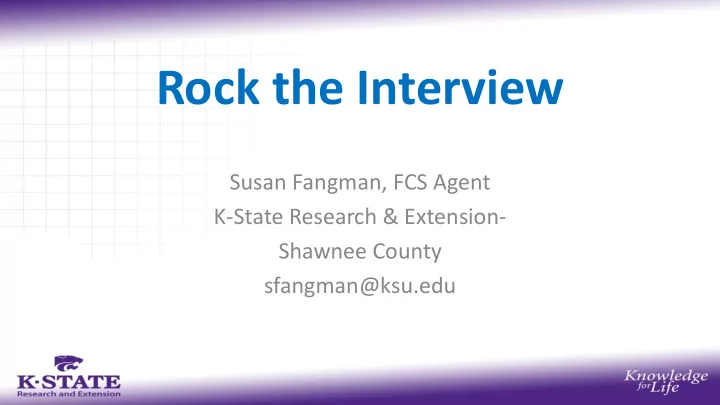

Rock the Interview Susan Fangman, FCS Agent K-State Research & Extension- Shawnee County sfangman@ksu.edu
The Job Interview You have to sell yourself by the way you look and the way you act as well as the qualifications you present.
First Impressions • You have 3 seconds to make a good first impression • Impressions are based on your – Appearance – Body language – What you say and how you say it What is your first impression saying about you?
“You never have a second chance to make a first impression”
Appearance • Dress about one level above what you would wear to work – It is better to overdress than underdress • Wear clothing that is clean and pressed • Minimal jewelry • Shower and be well groomed • Go light on the cologne/perfume • No gum chewing
What Not to Wear • No flip-flops • No hats • No visible underwear (including bra straps, boxers) • No spaghetti straps, strapless tops, or bare midriffs • No shirts with offensive words/pictures • No tight fitting clothing • Depending on your workplace consider covering tattoos and removing piercings
Social vs Professional Appearance What you wear off the job or socially doesn’t have to be (and probably shouldn’t be) what you wear to work.
Do Your Research “Before everything else, Getting Ready is the secret of success.” -Henry Ford
Do Your Research • Review the job description • Learn all you can about the prospective employer – Research the organization’s website – What are their salary ranges?
Practice, Practice, Practice • Review commonly asked interview questions • Record yourself to practice • Eliminate filler words such as “um”, “like”, and “you know” • Practice speaking slowly and clearly
Assemble All Necessary Papers • Resume/References • Drivers License • List of questions you want to ask • Sample of work if applicable
What to Expect Interviews may vary in format: • One-on-one Interview • Panel Interview • Group Interview • Phone or Skype Interview • Interview over a meal
What to Expect Some employers use the following strategies as part of their interview process. You may be asked to: • Submit or evaluate a writing sample • Give a presentation to the interview committee • Take an assessment to evaluate potential fit • Engage in an active simulation
The Interview • Arrive early- but not too early • Go alone • Greet the interviewer, offer a firm handshake • Be pleasant and friendly, but businesslike • Do not chew gum • Let the employer control the interview • Avoid being a yes or no applicant
The Interview • Maintain eye contact • Stress you qualifications • In discussing your previous jobs avoid criticizing former employers or fellow workers • Show confidence!
The End of the Interview • Usually concludes with an opportunity for you to ask questions – When might a decision be made? • Thank the interviewer and send a follow-up thank you letter • When you leave make notes
Resources: • Essential Living Skills: Job-Ready Skills https://www.bookstore.ksre.ksu.edu/pubs/S134A. pdf • Dressing Professionally on a Budget https://www.bookstore.ksre.ksu.edu/pubs/MF288 1.pdf
Recommend
More recommend